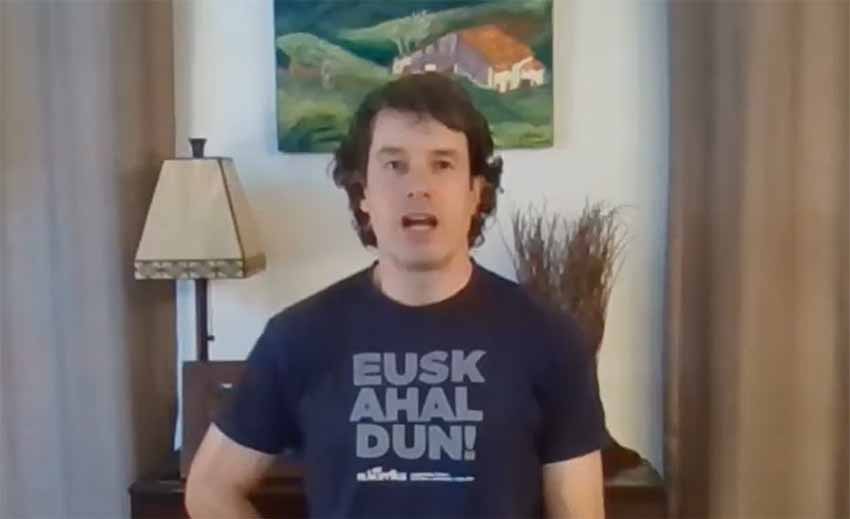Boise, Idaho, USA. A few weeks ago, we shared bertsos about the Coronavirus by Todor Azurtza from Boise. Todor is a Basque resident in Idaho’s capital, and a member of the local Basque club’s board of directors who often receives questions from his American friends about Euskera and the Basque culture. This time, he responded in verse in the Euzkaldunak Basque Club newsletter and now on EuskalKultura.eus.
This installment deals with Euskera and Bertsolaritza. Todor composed bertsos in Euskera that have been accompanied by their English translation.
Todor Azurtza Sorrondegi is former investment bank trader and business management consultant who, after 20 years working mainly in London and Paris, moved in 2016 to Boise (Idaho, US) where he currently manages investment properties. He feels profoundly Basque and takes advantage of any opportunity to promote his culture by teaching the language, taking part in cultural events in the diaspora or writing poetry. He considers himself a “bertsolari” wannabe, a singer of improvised verses in Basque.
Here are his bertsos in Basque and English
Maiz jende askok gure jaietan bertso saioa ikusita
entzundakoa ezin ulertuz egiten dute kritika
kuskizuna motela dela oso laua estetika
ahots kaskarra dutela eta faltatzen dela musika
saiatuko naiz azaltzen hemen bertsoak duen lirika
gurea dugun ohitura zaharra zergatik den hain polita.
Often people in our festivals, when they see a bertso session, unable to understand what they hear, criticize it. They say that the show is slow, that the aesthetics are flat, that the singers have a poor voice, that music is missing… I will try to explain in these verses the lyric of bertsos, and why it is such a beautiful old custom of ours.
Ez gara joaten bertso saiora ahots onak entzutera
nahiz eta kanta erabiltzen den bertsoa ez da Opera
hitzak, silabak eta errimak jarriaz denak batera
bertsolaritza poesia da bapatekoa gainera
sentimenduak, emozioak helaraziz bihotzera
bertsolaria dator plazara ikuslea hunkitzera.
We do not go to a bertso session to hear good voices; even if singing is involved bertsolaritza is not Opera. Bertsolaritza is poetry, putting together words, syllables and rhymes. Furthermore, it is improvised poetry. Transmitting feelings and emotions to the heart, the bertsolari aims to move the viewer.
Arte forma hau azaldu nahian saiakeran gu gabiltza
hitz joko hauek disfrutatzeko hizkuntzan daukagu giltza
hitzen mamia aditu ezean dena baita ulergaitza
gure hizkuntzak emanen die bertsoei beren bizitza
baina bestalde Euskarak dauka euskarri bertsolaritza
ohitura honek mantentzen baitu bizirik asaben hitza.
We continue trying to explain this art form… The key to understand these word games lies in the language since, unless you recognize the gist of the words, everything is incomprehensible. Our language gives life to the bertsos, but on the other hand, bertsolaritza supports Euskara, this tradition keeping our ancestors’ language alive.
Ederra, Todor, eskerrik asko!






 Send to a friend
Send to a friend Add comment
Add comment








